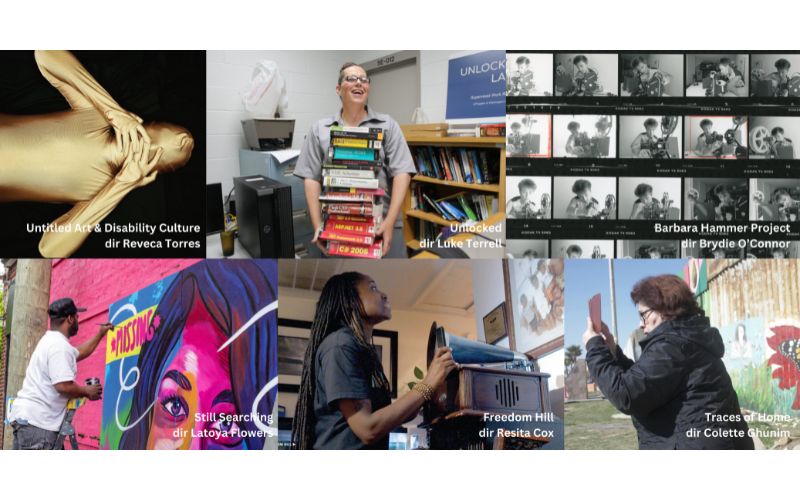
- Details
- By Kaili Berg
Chicago-based documentary company Kartemquin Films is partnering with streaming giant Hulu to offer a $30,000 grant for Indigenous filmmakers.
The Kartemquin/Hulu accelerator grant is designed to support projects that are already in development or in the later stages of production, according to an announcement from Kartemquin.
Kartemquin Films has been creating documentaries for more 50 years. One of their most famous films, 1994’s hit Hoop Dreams, one of the most critically acclaimed filmed of all time.
Each year, the accelerator grant focuses on the untold stories of communities in the margins.
The company’s grant partnership with Hulu began a few years ago with the production of 2018’s Minding the Gap, a documentary by director Bing Liu that chronicles the lives of three young men living in the Rustbelt who bond over their love of skateboarding. The film was Hulu's first to be nominated for an Academy Award.
“This grant is an opportunity for Hulu to connect with fresh talent in the documentary world,” Stacy Robinson, Kartemquin’s interim artistic director, told Native News Online.
This year, the focus of the grant is on Indigenous filmmakers from the Midwest. Robinson said the decision to center this year’s grant around Indigenous narratives aims to address the historical underrepresentation of Native American voices in film.
"Documentary filmmaking has historically been inaccessible to certain communities due to the high costs involved and the inequities in funding,” Robinson said. “This grant is our way of helping to balance the landscape and ensure that Indigenous filmmakers have the opportunity to tell their stories.”
The $30,000 grant offers more than just financial support. Recipients will also have access to Kartemquin’s vast network of industry professionals, mentorship opportunities, and potential distribution channels through Hulu.
“We’re here to provide not only financial support but also the resources and feedback filmmakers need to succeed,” Marie-Therese Garvey, producer at Kartemquin, told Native News Online. “We want to help them develop their projects and connect with others in the industry.”
Kartemquin and Hulu are looking for films that offer authentic, personal perspectives on a variety of topics, including social justice, environmental issues, and cultural stories.
"We want to see films that come from a deeply personal place, stories that reflect the filmmaker’s connection to their community and the issues they care about," Robinson said. "It’s important to us that the communities featured in these films are stakeholders in the story, not just subjects. We want to support filmmakers who are committed to ethical storytelling.”
While many of the projects supported by the Kartemquin/Hulu accelerator program are still in progress, the success of Minding the Gap shows the potential impact of this grant. Another grant recipient, Resita Cox, produced a award-winning short film Freedom Hill through the accelerator program and led to her receiving a Sundance Film grant.
“This grant isn’t just about making a deal with Hulu,” Robinson said. “It’s about giving filmmakers the tools and support they need to keep growing, whether they stay with Hulu or move on to other projects.”
The application process is open to Indigenous filmmakers with some experience, ideally those who have completed and distributed a film of any length. Kartemquin and Hulu are particularly interested in projects that are in early to mid-production, and those that plan to have an impact campaign beyond the film itself.
Applicants are encouraged to submit a proposal outlining their project, its current stage of development, and how the grant will help them complete their documentary. This is an opportunity for Indigenous filmmakers to gain the support needed to bring their stories to life and contribute to a more inclusive media landscape.
For more information on how to apply, filmmakers can visit Kartemwuin Films’ website. The deadline for applications is August 31, 2024. Kartemquin encourages eligible filmmakers to seize this opportunity.
“We see this as just the beginning—a chance to build lasting relationships and bring more Indigenous stories to the forefront,” Robinson said. “The world is ready for these stories, and we’re here to help make them happen.”
More Stories Like This
Watermark Art Center to Host “Minwaajimowinan — Good Stories” ExhibitionMuseums Alaska Awards More Than $200,000 to 12 Cultural Organizations Statewide
Zuni Youth Enrichment Project Takes Top Emerging Artist Apprentices to Phoenix for Artistic Exploration and Cultural Immersion
From Dishwasher to Award-Winning Chef: Laguna Pueblo's Josh Aragon Serves Up Albuquerque's Best Green Chile Stew
Rob Reiner's Final Work as Producer Appears to Address MMIP Crisis
Help us defend tribal sovereignty.
At Native News Online, our mission is rooted in telling the stories that strengthen sovereignty and uplift Indigenous voices — not just at year’s end, but every single day.
Because of your generosity last year, we were able to keep our reporters on the ground in tribal communities, at national gatherings and in the halls of Congress — covering the issues that matter most to Indian Country: sovereignty, culture, education, health and economic opportunity.
That support sustained us through a tough year in 2025. Now, as we look to the year ahead, we need your help right now to ensure warrior journalism remains strong — reporting that defends tribal sovereignty, amplifies Native truth, and holds power accountable.
 The stakes couldn't be higher. Your support keeps Native voices heard, Native stories told and Native sovereignty defended.
The stakes couldn't be higher. Your support keeps Native voices heard, Native stories told and Native sovereignty defended.
Stand with Warrior Journalism today.
Levi Rickert (Potawatomi), Editor & Publisher


